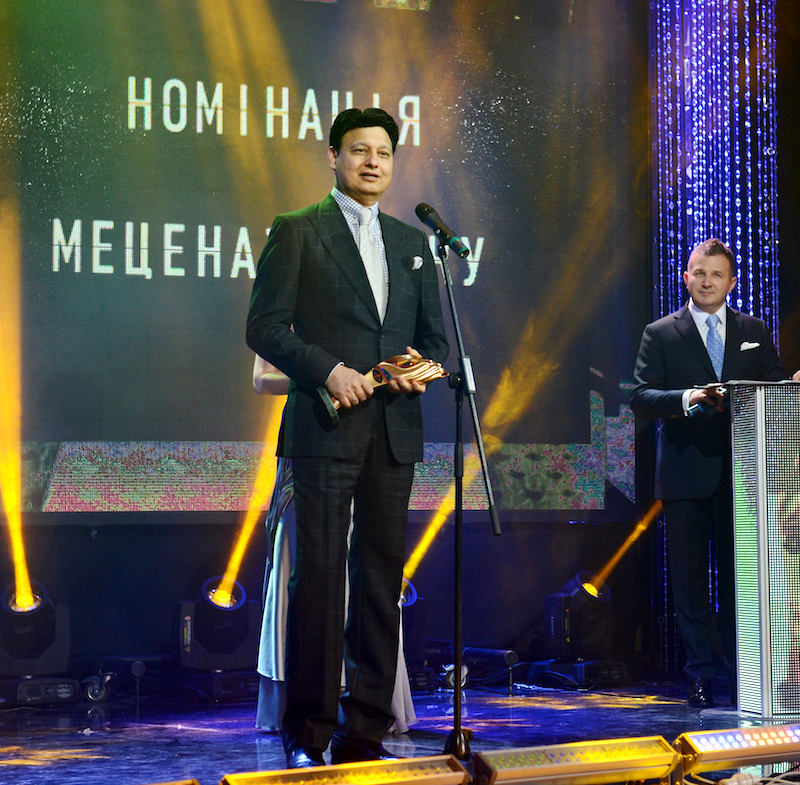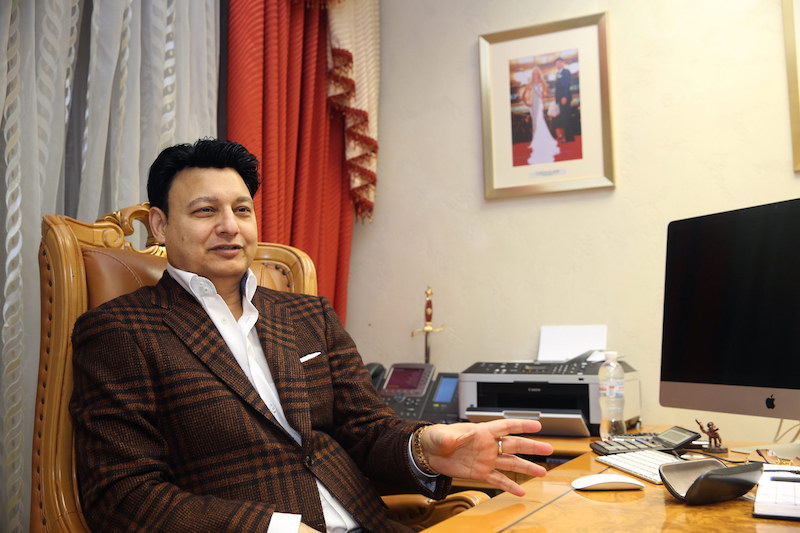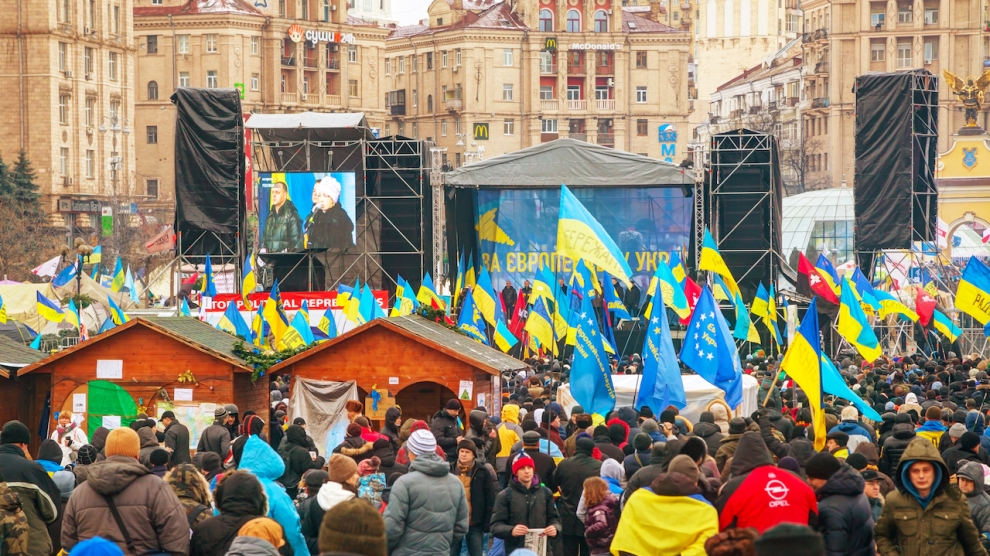After two years of contraction—seven per cent in 2014 and 12 per cent in 2015 — the Ukrainian economy returned to growth in 2016 and is expected to increase by more than two per cent in 2017. However, that is not the case for Donetsk and Luhansk, which are still engaged in the military conflict and where the manufacturing sector has contracted by 32 and 42 per cent respectively.
Dr Mohammad Zahoor, a Ukraine-based, British businessman of Pakistani origin and the founder and owner of the ISTIL Group and publisher of the Kyiv Post, spoke to Andrew Wrobel about how his business has been affected by the Russian-Ukrainian conflict, the investment opportunities the country offers and the recent reforms following Maidan as well as Ukraine’s integration with the West.

We last spoke less than a year after the Maidan situation and you had already been doing business in Ukraine for more than a few decades. How have your operations in Donbas been affected over the past three years?
Well, we have been affected quite significantly. Our coal washing plant, that was a very good profit-making business, is gone. Our hotel in Donbas is still controlled by the separatists. Plenty of our people, living in the eastern-most part of the country, have had to leave their homes, so business-wise, it is a terrible situation over there.
Once you have incurred losses in one region, you want to make profits somewhere else to make up the gap. Unfortunately, that hasn’t happened and is not happening here either. Not enough has been done to get out of that crisis, I must admit. That means our other businesses are not doing well. For example, we had a satellite channel packaging firm but people were not able to pay the $1 a month for subscriptions. We had a TV studio but there was no demand for content, so we had to dispose of it. We just disposed those things at huge losses, instead of carrying them.
What are you focussed on now?
Right now, we are investing money to finish our hotel project and we have also invited some partners to join, as we would like to share the risk.
It seems that quite a few foreign companies have left Ukraine, but at the same time everyone is talking about the enormous potential Ukraine offers. Where is it? What is the problem?
First of all, the problem is corruption. The country hasn’t reformed itself. Cronyism still exists. It’s not that nothing is happening here. In fact, there are a few new regulations which have been approved and even implemented, but I think a lot things have been changed only cosmetically.
The agricultural sector here was, and still is, quite profitable and a lot of companies are investing in it. If foreign investors could buy land in Ukraine much more investment would come in. The IT sector is thriving, but I meet representatives of large multinational IT companies who say that they have offered the government financing for new courses at universities, to increase the number of students, but the government has ignored the offer. Of course, they weren’t doing it for free—after the students’ graduation those companies would have had access to more Ukrainian IT specialists.
Finally, as far as the free trade agreement with the European Union is concerned, the country offers great manufacturing opportunities and large giants are in production here already. Ukraine has the cheapest labour market in the world; even cheaper than China, because of the depreciation of the hryvnia, so it’s good time to invest in that area also.
So, you would bet on manufacturing? Unilever recently opened a production facility, didn’t they?
Yes, any type of manufacturing—shoes, textile, outfits, what have you—because Ukraine is very close to the European Union, I would say manufacturing is a good bet, but that’s purely for exporting it back to the EU. IT and agriculture are also sectors where I see the largest potential.
Okay, so we have those three industries. But at the same time, the country faces quite a few challenges, right? How would you convince prospective investors to consider investing in Ukraine?
I would say there is no faith in the government. Investors, who are up to date with what happens on a daily basis, actually find the country too risky. They don’t always want to come even if the government is offering incentives.
There is not much confidence left because no structural changes have been made. The reforms are not there. The tasks have taken too much time and effort, such as European integration, visa-free travel, joining NATO, an innovative economy etc. Just think about reducing corruption, making a nice judiciary system, whatever. So, the plans are huge, but what has actually been done?
We are trying to help here. We are trying to set up a $50 million package fund and to acquire certain assets, which we think are the right assets, based on our presence and experience in this market for so many years. We believe that if someone invests with us they will achieve a great return on their investment.

Bearing in mind the overall picture, what message would you pass on to prospective investors?
Well, if you look at whole picture, it looks very gloomy—if you go by the set rules, you would never invest in Ukraine because hardly anything works well. I would say some 90 per cent of investors would have that opinion. There are maybe ten per cent who like adventures, who like risk-taking and who would consider Ukraine as an investment destination.
So, coming back to the fund, you mean a fund managed by the ISTIL Group?
As the ISTIL Group, we are not licensed to do that but, yes, we would rather be some sort of custodians of the funds coming in here, through various fund managers, and we would rather tell them what to do with the money.
I see. Now, we already talked a bit about the last three years and you said not much has been achieved. How do you see Maidan from the three-year perspective?
Put very simply, I would say that there were people who wanted change but there were also dacoits and bandits. They robbed people quite openly and people knew they were bandits. In the eyes of the world, we have the most reformist parliament and the government but the people have not benefited from it at all. At the end of three years, people have become much poorer.
All the benefits of being a reformist movement have not been passed on to the stakeholders, so the people are not happy. There are even voices that say that if things don’t change then, when the next election comes, someone more favoured by Russia might come to power. If we look at Russia, Mr Putin has been able to find more partners in the West. We have had the Brexit referendum and Mr Trump has been elected across the Atlantic.
After three years, I don’t think Ukraine has gained much. They have lost Crimea. Some of the most industrialised parts of the country are still occupied. There are people in power who are not taking good care of the country. President Poroshenko – though a good businessman himself – has surrounded himself with his friends, who are business partners etc., and these people are not passing on the benefit to ordinary Ukrainians.
So, in other words, was Maidan worth the time and effort?
Well, it was worth it because what was going on here, before, was intolerable. The result of Maidan is still to be delivered and there are still questions to be answered: was a revolution necessary? Should more time have been given to Yanukovych? Perhaps, if the latter had been carried out, a transition would have been easier—after the revolution, Yanukovych knew the people had the power and the people fought for a transition, however, people who here at Maidan for speeches etc. were booed. People knew that those who came to speak had their own agendas and that they were not future leaders. Unfortunately, Maidan didn’t produce any leaders at all. That was the worst part of it.
The most positive result of Maidan is that the people have become more patriotic. However, for me, patriotism and nationalism are very close to one another and that must be reviewed very carefully.
When we spoke two years ago, you said you weren’t really happy with how the West reacted to the conflict between Ukraine and Russia. Has your view changed?
I think western countries and leaders are being fooled quite successfully by the Ukrainians. The only promise they can make is that they will be against Russia, but that’s what they actually want.
Now, I have said this before and I am saying this now—doing harm to Russia doesn’t mean doing good to Ukraine. The West is trying to harm Russia. Sanctions are not a solution. The Russian economy is not doing well but has this changed Russia’s approach? Of course, not. The Russians have found their own way—they have gone to China and other places.
While a food producer, for example from the UK, complains about their government because they cannot export their products to Russia, farmers in Argentina, Brazil, India, Pakistan are praying for these sanctions to last forever because they are benefiting from the situation.
So, I think to some extent, nothing has happened. Mr Putin never meant to bring his entire army to Ukraine. He keeps sending his people there to just run the local army, to train people and to fight with Ukraine. He keeps supplying them with equipment and he would continue to do this, whether the sanctions were in place or not.

What could change Mr Putin’s approach then?
Firstly, we must look at the root of the problem. If we look at Crimea and Ukraine (people will not like my saying so, but) I believe we should go and talk to the Crimean people and ask them whether they would like to come back to Ukraine or not. I am totally against what Russia has done in Ukraine with Crimea — they signed a memorandum respecting the Russian-Ukrainian borders in Budapest in 1994, and two decades later they just took over part of the country.
Let’s imagine that if the people of East Timor revolted against the Indonesian government, the entire West, including America, would support them and would create a separate republic for them. It might be a Muslim talking right now, and they are Christians, but I think the West has a way of creating a problem out of nothing, or forgetting a problem when it is huge. So why don’t we imagine for a moment that Crimea is now East Timor and they want their independence from Ukraine?
It is clear that the way Russia did it was wrong but it was the desire of most of the Crimean people. I am an outsider here and I can have an independent view here: the Crimean situation happened, so what? This also happened in Pakistan in 1971, with Bangladesh. They did not want to be part of Pakistan. Bangladesh became Bangladesh and it is still Bangladesh today. So, why don’t we just apply the same principle from that problem to Crimea? Because the West supports Ukraine. If it was Ukraine who had taken over Crimea, I think it would have been much easier for the West to justify it.
I see. At some point, you mentioned the European integration, and again, I remember, from our discussion, that you said that Ukraine should remain neutral.
Exactly. The first thing is that Ukraine should never become part of NATO. I am totally against that because the country should use its position just as Switzerland has been using its location. Why can’t Ukraine make a good deal with West and with the East, with its geo-political position?
Would the occupation end if Ukraine stopped pursuing its integration into the EU?
I think Mr Putin would be very happy. In fact, after that he might no longer be interested in the conflict in Donbas. If he doesn’t feel there is a threat from Ukraine, then why would he keep using his people, his energy, and resources to solve a problem which isn’t his? Ukraine has to stay neutral.






Add Comment